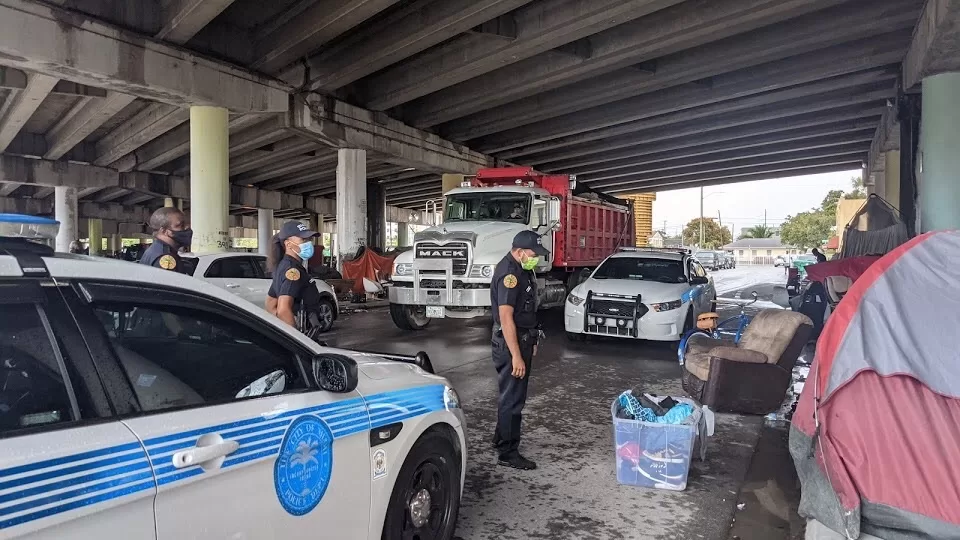NORTH MIAMI BEACH, FL — While what’s predicted to be the worst hurricane season in years is about to descend on the Sunshine State and beyond, the perfect Category 5 storm is already approaching for those experiencing homelessness.
Long known to homeless advocates like myself as one of the meanest states in the nation when it comes to criminalizing those who have no shelter, this year Florida has taken its misplaced animus to another level.

Miami cops harass homeless man inside his tent beneath the I-395 overpass before trashing it, Feb., 2021. Enforcement actions like this will only become more common when Florida’s statewide camping ban takes effect come October. Photo cred: A. Soleil
The once presidential candidate, Gov. Ron DeSantis, already notorious for his hatred of anything ‘woke’ – like teaching Black history; diversity, equity, and inclusion frameworks in academia and workplaces; rent control (he precluded local government from passing such protections) – recently signed into law a bill (HB 1365) that will make homeless encampments completely illegal in any public space from Pensacola to Key West.
The right-wing legislature, which only asks how high when DeSantis says “jump,” wrote the odious bill, which DeSantis signed into law in Miami Beach in March. He chose that iconic, majority Democrat-run city because it already had passed its own draconian anti-camping law last October, which has led to dozens of arrests.
Miami Beach just adds fuel to the reality that when it comes to war, homelessness, and even genocide – of Palestinians or our own homeless communities – D’s and R’s alike operate from the same playbook.
What’s especially repugnant about the new law, which will take effect on October 1, is that it leaves it to counties and municipalities to fund the only permissible spaces where unsheltered homeless folk can sleep: Sanctioned homeless encampments subject to approval by the Department of Children and Families.
The encampments must provide restrooms, running water, behavioral health services, and security guards, ostensibly to keep people safe. But since encampment rules preclude any use of alcohol or drugs – infantilizing homeless folk has long been the ruling class standard – it’s more likely that the key role played by the guards will be snitching.
Also included in the new law is a provision that has the not-in-my-back yard (NIMBY) crowd salivating. Any individual, business, or the State Attorney General can sue a jurisdiction if they deem that an unsanctioned encampment impacts their quality of life, i.e., property value.
What’s not included? Funding for decent, affordable, public housing, the one essential ingredient that equates to extracting ourselves from the 40+ year-old quagmire of systemic homelessness once and for all.
If all of that comprised the totality of this nightmare scenario, we might not be so bad off. Civil rights lawyers I’ve spoken with tell me that, on its own merits, HB 1365 would almost certainly be challengeable on constitutional grounds.
In fact, important litigation regarding camping bans has already been brought in western states, where six years ago the Martin v. Boise case, ruled on by the U.S. Court of Appeals for the Ninth Circuit, established that banning camping in the absence of available shelter constitutes a violation of the 8th Amendment proscription on “cruel and unusual punishment.” This year, however, that ruling has shifted to very shaky ground.
Whereas a slightly less conservative Supreme Court opted not to hear an appeal of Martin in late 2019, this year they took on a related case – Johnson v. Grants Pass – which the Ninth Circuit used to reaffirm the Martin case in 2022.
Oral arguments were presented before the Supremes on April 22, and while we await their ruling, which is expected sometime in June, the consensus among lawyers with long resumes battling ordinances that criminalize homelessness isn’t encouraging.
According to Jeffrey Hearne, Chief Advocacy Officer at Legal Services of Greater Miami, Inc., who was present for the Supreme Court hearing, “You can never tell exactly how the Court will rule based upon an oral argument. Justice Barrett questioned whether 8th Amendment claims should be raised defensively in an individual criminal prosecution instead of through a pre-enforcement action like the one against Grants Pass. It wouldn’t surprise me if that ends up being the majority’s ultimate position. On its face, that ruling would preserve individual rights, but, in practice, would likely lead to increased criminalization.”
If history is instructive here, Hearne’s assessment is spot on. Absent the existing protections provided by the Ninth Circuit rulings invoking the 8th Amendment, it would fall on individual homeless plaintiffs to find attorneys to file cases against what will likely be a flood of unconstitutional anti-camping enforcement in cities coast to coast. And the chance of that happening among a populace whose primary daily task is simply to survive is very slim, indeed.
You can contact Jeff Weinberger at: http://october22alliance.wordpress.com or via cell phone at 954-839-5376 or Facebook: https://www.facebook.com/Shelter-Accountability-Project-Broward-106214968842004
Jeff Weinberger, founder of the October 22nd Alliance to End Homelessness, has been advocating for the civil rights of people experiencing homelessness for 15 years. His street outreach has led to successful federal lawsuits to overturn unconstitutional bans on panhandling in several Florida cities, and to end the City of Miami’s indiscriminate trashing of homeless folks’ property.
